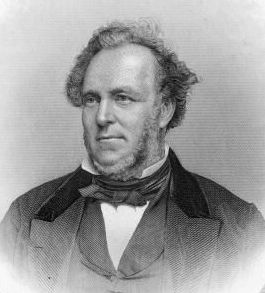|
Park Benjamin
"Park Benjamin is descended from a New England family, which came originally from Wales. His father resided as a merchant in Demerara, in British Guiana. The son in his infancy suffered from an illness, the improper treatment of which left him with a permanent lameness. He was brought to American, was educated in New England, studied law at Cambridge, and was admitted to practice in Connecticut. He soon, however, withdrew from the law to the pursuits of literature, embarking in the editorship of the New England Magazine in March, 1835, shortly after the retirement of its projector, Mr. Buckingham. In less than a year he brought the work to New York, continuing it with the publishing house of Dearborn and Co., with which he became connected, as the American Monthly Magazine, five volumes of which were published from January, 1836, to June, 1838. He next published the New Yorker, a weekly journal, in association with Horace Greeley; and in January, 1840, established the New World, a weekly newspaper of large size, which met the wants of the day by its cheap, wholesale republication of the English magazine literature. It was also well sustained by a corps of spirited writers which the editor drew round him in its original departments. Of those more immediately connected with the conduct of the paper were Epes Sargent, James Aldrich, H.C. Deming, and Rufus W. Griswold . . . . The success of the New World led to the cheap publishing enterprises of Winchester, which were conducted with boldness, and had for the time a marked effect on the book trade. Mr. Benjamin conducted the New World for nearly five years, when it passed into the hands of Mr. Charles Eames, a writer of marked ability, by whom it was edited for a short time in 1845, when it was finally discontinued. In 1846 Mr. Benjamin projected, at Baltimore, The Western Continent, a weekly newspaper on the plan of the New World. It was published only for a short time. The next year he published another weekly paper on a similar plan, involving a liberal outlay of expenditure, The American Mail, of which twelve numbers were issued from June 5 to August 21. Mr. Benjamin's poems, lyrics, and occasional effusions are numerous, but have not been collected. They are to be found scattered over the entire periodical literature of the country for the last twenty years. His only distinct publications have been several college poems of a descriptive and satirical character. A poem on The Meditations of Nature was delivered before the alumni of Washington College, at Hartford, in 1832; Poetry, a Satire, before the Mercantile Library Association of New York, the same year; Infatuation, before the Mercantile Library of Boston, in 1844. Park Benjamin died, after a brief illness, at his residence in the city of New York, September 12, 1964. In his later years he was much before the public as a popular lecturer on social and other topics, his discourses on which were varied with the recitations of humorous or satirical poems of his own composition. Though a fertile author of occasional poems, and of numerous prose contributions to periodicals, no collection of his writings has been published. His style, both in prose and verse, was marked by ease and fluency." [Evert A. & George L. Duyckinck, The Cyclopaedia of American Literature 344-345 (Philadelphia: William Rutter & Co., 1880)(Vol. 2)]
Edgar Allen Poe provides the following commentary on Park Benjamin's poetry:
[Source: Edgar Allan Poe, "A Chapter on Autography (Part I)," Graham's Magazine, November 1841, pp. 224-234] "The most popular of Benjamin's poems were widely published, often under revised titles, in anthologies. The most important of these books was Griswold's The Poets and Poetry of American . . ., Philadelphia, 1842, which contains twenty-eight of his poems . . . ." "Park Benjamin, 1809-1864," in Jacob Blanck (compiler), 1 Bibliography of American Literature 197-207, at 197 (New Haven: Yale University Press, 1955) Park Benjamin Park
Benjamin Poems Selected
Sonnets The
Old School House A
Song.-When First I Saw Thee Park Benjamin, Infatuation: A Poem (Boston: Association Boston, W. D. Ticknor and Company, 1844)(delivered to the Mercantile Library Association of Boston, October 9, 1844) [online text] [online text] ___________, A Poem on the Meditation of Nature (Hartford: F.J. Huntington, 1832)(spoken September 26th, 1832, before the Association of the Alumni of Washington College) [online text] [online text] ___________, Poetry, a Satire (New York: J. Winchester, 1842)(pronounced before the Mercantile Library Association at its 22nd anniversary) [online text] [online text] Poetry Park Benjamin, Poems (New York: Columbia University Press, 1948) ___________, Poems of Park Benjamin (Freeport, New York: Books for Libraries Press, 1971) Writings Park Benjamin, The Book of British Ballads (New York: Douglas printers, 1844) Bibliography "Park Benjamin, 1809-1864," in Jacob Blanck (compiler), 1 Bibliography of American Literature 197-207 (New Haven: Yale University Press, 1955)(an authoritative listing of Benjamin's publications) Merle M. Hoover, Genealogy of Park Benjamin (New York: Columbia University Press, 1948) ______________, Park Benjamin: Poet & Editor (New York: Columbia University Press, 1948) Research Resources Park Benjamin, Sr. |

